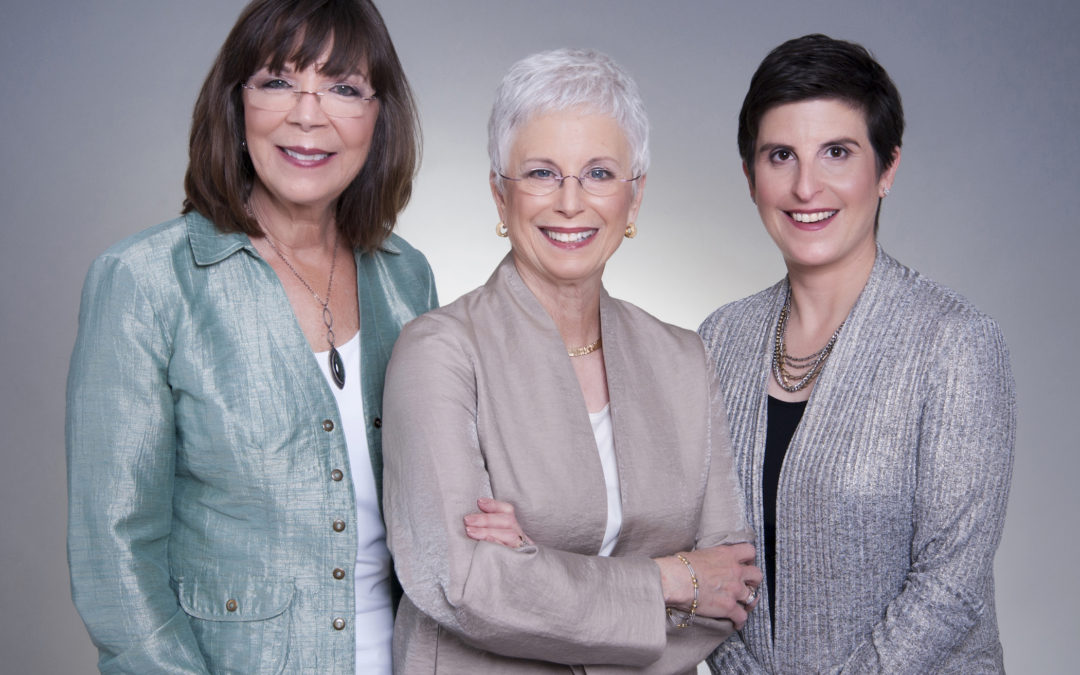
Center for Mentoring Excellence Leadership Team shares stories of the past and recommendations for the future
Lois, Lory and Lisa share many things in common when it comes to mentoring, but it’s their individual approach and unique outlook that make them such a successful team. This spirit of individuality and their complementary skills were highlighted in a recent interview, where they were asked about their passion for mentoring, what they’ve learned from mentors, and their advice to new mentors.
Here’s what they had to say:
Why are you passionate about mentoring?
LOIS: My personal mentoring stories are many. I marvel at how my mentors raised the bar for me, led by example, pushed me beyond my personally defined limits, encouraged me to enlarge my thinking, and believed in me even when I was not sure of myself. I am grateful for their time, their stories and their commitment to my growth. And, while most of my experiences were positive, there were a few that could have gone better. I had no clue then that there were things I could have done, could have said, could have asked, and could have tried that would have allowed me to make the most of my mentoring relationships. I didn’t realize that as a mentee I had an instrumental role to play in shaping the relationship and defining the outcomes of the relationship. So for me, mentoring is both personal and professional. I pay it back, every day and in every way that I can. My passion is reignited every time I work with my many diverse clients and I see how mentoring has helped them change, both themselves and the world around them.
LORY: I’ve interviewed hundreds of mentors and mentees over the past 18 years and heard their stories about breakthroughs, renewed confidence, and shifts in thinking. Their stories have inspired me. I get energized listening to people talk about their renewed sense of energy and commitment to their work because of the support and positive feedback they’ve received from mentors. I recently spoke to a mentee who told me how his mentor helped him see why certain stereotypical beliefs were holding him back and undermining his success at work. When he was finally able to turn his behaviors around, the stress and tension disappeared and new opportunities opened up. It’s exciting to see the transformative power of mentoring play itself out, time and time again.
LISA: I believe the best way to make a difference in the workplace is to help employees feel connected, valued and heard. I think that mentoring is the ideal way to accomplish this, because it creates a safe and powerful space for a mentee to gain perspective, focus on his/her own needs and ask questions that broaden their perspectives of themselves, their teams, and their organization.
What have you learned from your mentors?
LOIS: I’ve learned to listen to my own voice, to think outside the box, to let my creativity shine through, and to never give up. And that’s only the start of it. I’ve learned from observing my mentors in action, how they model the art and practice of being a reflective practitioner and asking deep, penetrating questions.
LORY: My first mentor believed that I had the skills and talent to be successful. He believed in my abilities more than I did. He inspired me to take risks and take on assignments that I would never have done without his support. I learned to believe in myself and see myself as a capable leader. My mentor also helped me understand how to think strategically and understand the politics of the institution. In a sense, he helped me see how the chess pieces moved. I learned to think several steps ahead, rather than jump in and make decisions on the fly.
LISA: I’ve learned to slow down, and to step back and think about the impact my role can have on the organization as a whole. This has helped me be more strategic and focus my own development so that I can have the greatest impact. I’ve learned to pay attention to what lights me up. I’ve learned to appreciate the positive feedback I get and to process difficult feedback constructively and in the proper context.I’ve learned a ton about the importance of developing relationships with people who believe in me and to nurture those relationships.



What are the top 3 things you’d like a new mentor to know?
LOIS:
- Pay attention to your intuition. Your gut feeling is more often right than wrong.
- Don’t be afraid of the silence. Silence allows a mentee to catch up, to process, and come up with new insights.
- You don’t need to know everything. A good question is the most powerful tool in your mentor’s toolkit.
LORY:
- Talk about your challenges and struggles with your mentee as well as your successes. It will make you more approachable and human.
- Believe in your mentees and let them know that you see their potential. They are doing the heavy lifting and your positivity helps them continue the effort.
- Push your mentee out of their comfort zone. It’s the only way they will reap real rewards.
LISA:
- Share your own experiences — the good stuff and the stuff that might not be so good. It makes a world of difference for mentees to know you are human and that you can bounce back from difficult experiences.
- Give honest but constructive feedback — and help the mentee turn it into something actionable. Mentees can make great gains if they get honest feedback from their mentors. It helps many mentees to have a space to talk about the best ways to improve.
- Check in on the relationship. If something the mentee is doing isn’t working for you, or is sabotaging their own progress, share it with them as soon as possible. Some of the greatest progress has come from mentoring relationships that started out rocky, but where the participants addresses issues openly, swiftly, and willingly.


